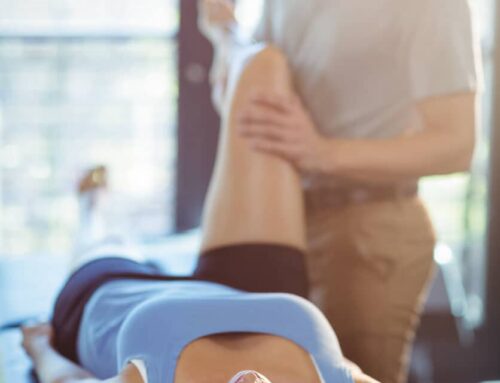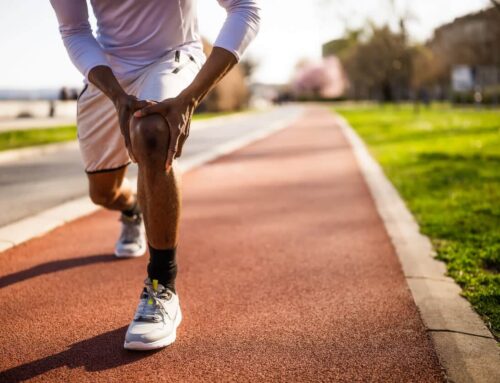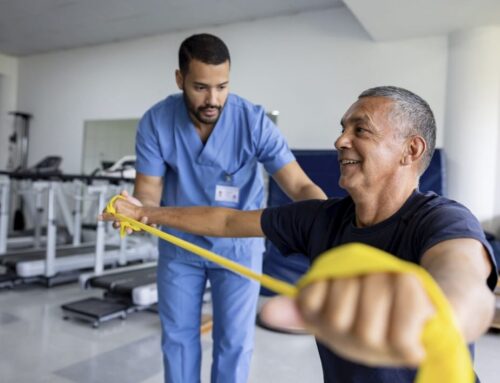“Weekend warriors” are adults who occasionally play sports or engage in strenuous physical activities, often on the weekends. They enjoy staying active and playing hard after sitting at work all week. Many weekend warriors are former athletes who love to compete but no longer practice daily like they did in their teens or twenties. The combination of their mostly sedentary lifestyle paired with occasional bursts of activity creates a recipe for weekend warrior injuries.
This article shares the most common sports injuries that weekend warriors experience. It also offers injury prevention tips and treatment options for the aging athlete.
1 – Knee injuries
Few professional football or soccer games end without an athlete going down because of some sort of knee injury. If it happens to the pros, weekend warriors are even more susceptible to knee injuries due to wear and tear over the years.
Common weekend warrior knee injuries include muscle strains, sprains, meniscus tears, cartilage tears, runner’s knee and ACL injuries. As weekend warriors’ bodies age, the tendons, ligaments and cartilage begin to wear down and muscles get weaker.
Prevention
Avoid injuries to the knee by warming up and stretching well before exercising. Create a gradual exercise routine to strengthen your core, hips and the muscles around your knee. If something hurts, listen to your body and stop.
Treatment
Treatments for knee injuries range significantly based on the injury. Common treatments include rest, icing, braces and anti-inflammatory medicines like ibuprofen. More intense treatments include injections, physical therapy and surgery.
2 – Ankle sprains
Ankle sprains are common in many sports and activities. Walking, running, hiking, baseball, softball, racquetball, contact sports and even pickleball can leave weekend warriors with a sprained ankle.
People experience ankle sprains when they turn or roll their ankle and pull the ligament too far. Sprained ankles cause pain, swelling, stiffness and bruising.
Prevention
Invest in and wear good shoes with adequate support to prevent ankle sprains. Also, practice balancing exercises at home to strengthen support muscles.
Treatment
Treatment for a sprained ankle usually starts with RICE (rest, ice, compression, elevation). A doctor may also recommend taking an anti-inflammatory medication like ibuprofen. If the sprain is severe, an orthopedic doctor may recommend immobilizing the ankle to give it time to heal. Physical therapy can also help to strengthen the ankle and surrounding muscles.
3 – Shoulder injuries
The shoulder is another area prone to weekend warrior injuries. Sports with intense, repetitive overhead arm action like tennis, baseball and golf can cause shoulder injuries. They can also result from sudden trauma like a fall or a blow.
Shoulder conditions include overuse injuries, strains, dislocations, ligament strains and rotator cuff tears. Older athletes find themselves in pain and with limited range of motion.
Prevention
Warm up and stretch well before and after the activity to prevent a shoulder injury. Gradually strengthening the shoulders, arms and core also helps.
Treatment
When a shoulder injury occurs, use the RICE method and an anti-inflammatory medication. Again, listen to your body, and contact an orthopedic physician if the pain persists. A shoulder injury may require a steroid injection, physical therapy or even surgery depending on the severity.
4 – Hamstring strains
A hamstring strain can occur from almost any sport or activity. The forceful overstretching of a stiff or weak hamstring muscle causes a hamstring strain.
Prevention
Prevent a hamstring strain by warming up and stretching before and after exercising.
Treatment
After a hamstring injury, experts recommend resting, applying ice, using compression and elevating the affected area (RICE). Gentle stretching and avoiding activities until the muscle feels better is advised. If the hamstring prevents you from walking, causes severe pain or takes a long time to heal, reach out to your orthopedic doctor.
5 – Foot problems
Foot problems like Achilles tendinitis and plantar fasciitis increase as athletes age. Ligaments and tendons in the feet tend to decrease in elasticity as people get older. This makes them more prone to inflammation and tears. Tight leg muscles, the shape of the foot’s arch and pronation (when your foot rolls inward) can contribute as well.
Prevention
Building strength and flexibility in the feet will help prevent Achilles tendon injuries and plantar fasciitis. Wear good shoes with arch support and replace your shoes regularly.
Warm up and stretch before and after exercise, and do not overwork your feet. Finally, listen to your body to detect early signs like mild aches, swelling or decreased movement or strength.
Treatment
Treatment for common weekend warrior foot problems includes utilizing RICE and anti-inflammatory medications. Some cases may require braces, orthotic devices, steroid injections or surgery.
6 – Shin splints
Shin splints also make the list of weekend warrior injuries, especially for people who like to run. As the feet strike the ground over and over, the shock causes the leg muscles and bones to pull. The shins absorb a lot of the impact that can harm muscles ligaments and bones. The repeated pulling of tight muscles and ligaments can cause painful, swollen shin splints.
Prevention
Prevent shin splints by stretching well before and after high-intensity exercise. Wear supportive shoes, use proper running form and avoid running on hard and uneven terrain. Incorporate low-impact exercise into your routine to give your shins a chance to recover after running.
Treatment
Weekend warriors with shin splints should use RICE and anti-inflammatory medications. Shin splints can become serious if ignored and result in a stress fracture. Listen to your body and contact your orthopedic doctor if you have ongoing pain.
7 – Tennis elbow
Often affecting tennis players and golf enthusiasts, tennis elbow is a common malady for weekend warriors. Repeated arm movements can strain the forearm ligaments outside of the elbow. This results in pain, discomfort, stiffness and limited range of motion.
Prevention
To prevent tennis elbow, weekend warriors should stretch their forearms and wrists well before and after activity. Proper equipment use and correct techniques will also help prevent injuries. Weekend warriors should also strengthen their forearms and wrists with light weight lifting.
Treatment
Treatment for tennis elbow echoes the RICE and anti-inflammatory medication routine, as with other weekend warrior injuries. An elbow brace may be helpful to support the elbow while resting and gently returning to activity. Steroid injections, seeing a physical therapist or having surgery may be required.
Proper preparation prevents weekend warrior injuries
Weekend warrior injuries are often the result of poor preparation. If someone has not been physically active in a while, heading onto a field or court without preparation could result in an injury.
Participating in physical activity is important and encouraged. But before you join in, plan ahead with these tips.
- Gradually work to increase your fitness level. A good rule of thumb is to intensify your workouts by 10% each week. (The 10% rule encourages 10% more each week – 10% more minutes or distance or reps, etc.)
- Warm up and stretch well
- Wear good-quality shoes with appropriate support and use proper equipment
- Listen to your body and stay well-hydrated throughout the activity
Know when to see a doctor
Finally, don’t embrace the “warrior” part of the weekend warrior moniker and power through an injury that needs medical care. Pay attention to your injury. While it is normal to be sore with new activity, if the injury does not improve after a few days or if it is painful during normal daily activities, contact your healthcare provider or orthopedic doctor.
Go to your doctor right away if:
- your body part is visibly deformed
- you have extreme pain
- you cannot fully move your joint after resting it
- you cannot put weight on your leg or ankle
Treating your weekend warrior injuries sooner rather than later will help your body to recover and heal faster. It will also prevent further damage from occurring.






